10 Tools to Optimize Your Shared Company Calendar Management

Introduction
In today’s fast-paced business environment, effective communication is not just important; it’s essential for success. The management of shared company calendars has emerged as a critical element in achieving operational efficiency. As remote and hybrid work models gain traction, teams are on the lookout for tools that simplify scheduling, enhance collaboration, and reduce the chaos of overlapping appointments.
This article delves into ten innovative tools that are designed to optimize shared calendar management, highlighting their unique features and benefits. With a plethora of options available, organizations must discern which tool aligns best with their needs and cultivates a more productive work environment.
AutoSuite: Enhance Team Coordination with a Centralized Calendar
In today’s fast-paced work environment, communication inefficiencies can hinder productivity and collaboration. AutoSuite addresses these challenges head-on with its robust shared company calendar, which integrates seamlessly into existing workflows. This innovative solution simplifies the planning process for teams by enabling immediate meeting arrangements through Schedulelink, eliminating the tedious back-and-forth of emails. As a result, all group members stay aligned and informed, significantly enhancing overall productivity.
Organizations that have adopted centralized scheduling tools report a remarkable 71% increase in success rates, underscoring the effectiveness of these systems in improving coordination and minimizing scheduling conflicts. AutoSuite not only enhances visibility into group availability but also empowers teams to manage their appointments efficiently. With features designed to support both planned and actual timelines, it fosters a more collaborative work environment.
Operations specialists emphasize the importance of having a visual representation of timelines for prioritizing initiatives and achieving desired outcomes. Centralized scheduling tools like AutoSuite, which integrate a shared company calendar, are essential resources for modern organizations seeking to streamline their operations and enhance communication. Explore how AutoSuite can transform your team’s scheduling process and drive operational efficiency.
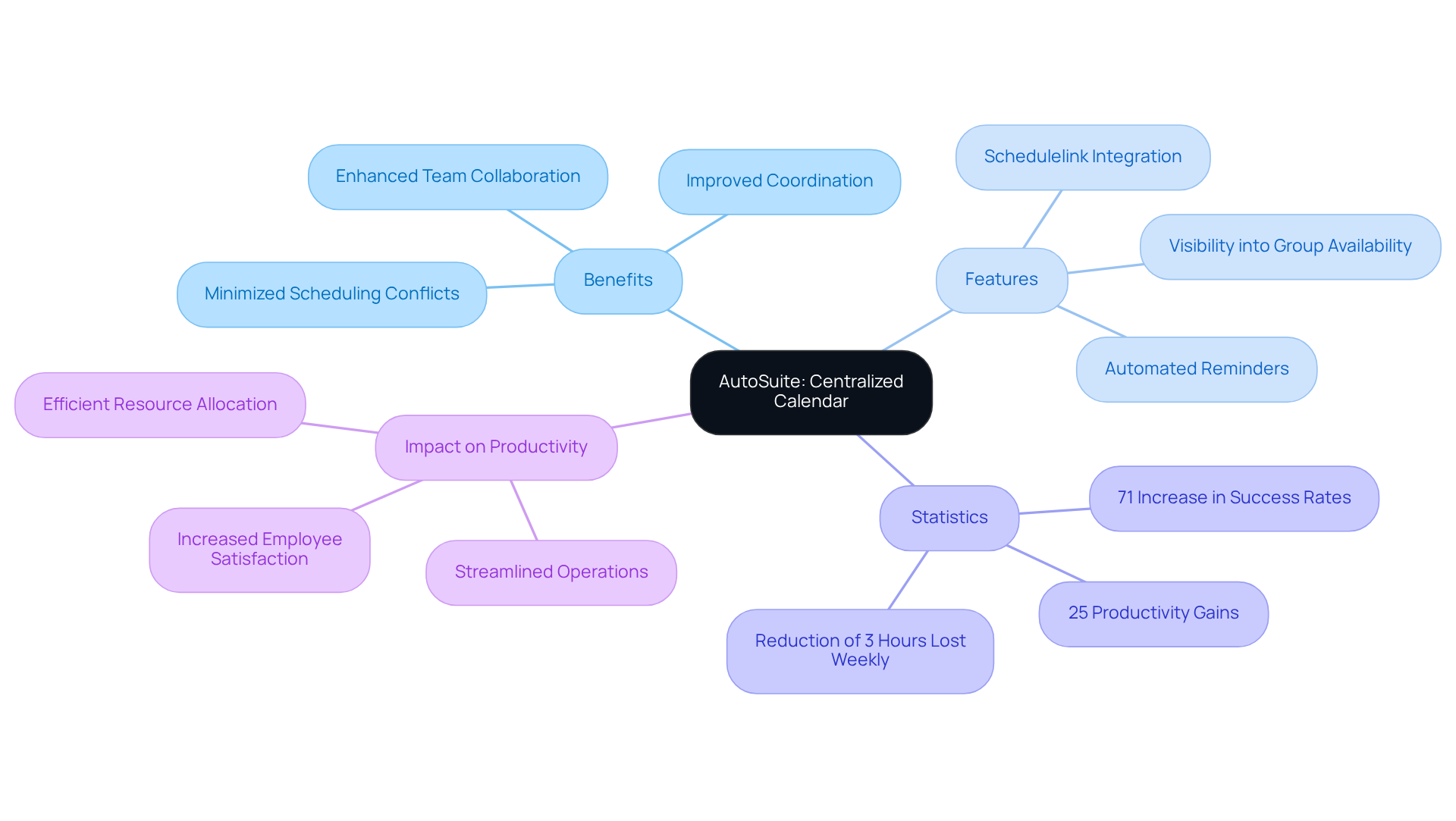
GroupCal: Simplify Schedule Management with Powerful Sharing Features
In today’s fast-paced work environment, communication inefficiencies can severely hinder productivity. GroupCal addresses these challenges head-on, offering powerful sharing capabilities that streamline the management of both personal calendars and the shared company calendar. With real-time updates and customizable permission settings, teams can collaborate effortlessly on scheduling, significantly reducing confusion and enhancing communication.
Organizations that prioritize coordination, particularly those with hybrid work models, find GroupCal to be a game-changer. It ensures that all team members are promptly informed of any changes or updates, fostering a culture of transparency. Industry leaders emphasize that effective collaboration hinges on timely information sharing. As one expert aptly noted, “the overall shift is toward fewer, clearer, more inclusive meetings that are worth the time.”
Moreover, organizations that utilize a shared company calendar report a remarkable 50% reduction in time spent on scheduling-related tasks and a 30% increase in collective efficiency. As trends in shared company calendar management evolve, tools like GroupCal are becoming essential for fostering teamwork and maintaining alignment in increasingly dynamic work environments. By adopting such solutions, organizations can significantly improve their operational efficiency and employee satisfaction, saving an average of 50 minutes daily – approximately 11.3 hours per week.
In conclusion, GroupCal not only addresses the pressing issue of communication inefficiencies but also empowers organizations to thrive in a collaborative landscape. Explore how GroupCal can transform your scheduling processes and enhance your team’s productivity.
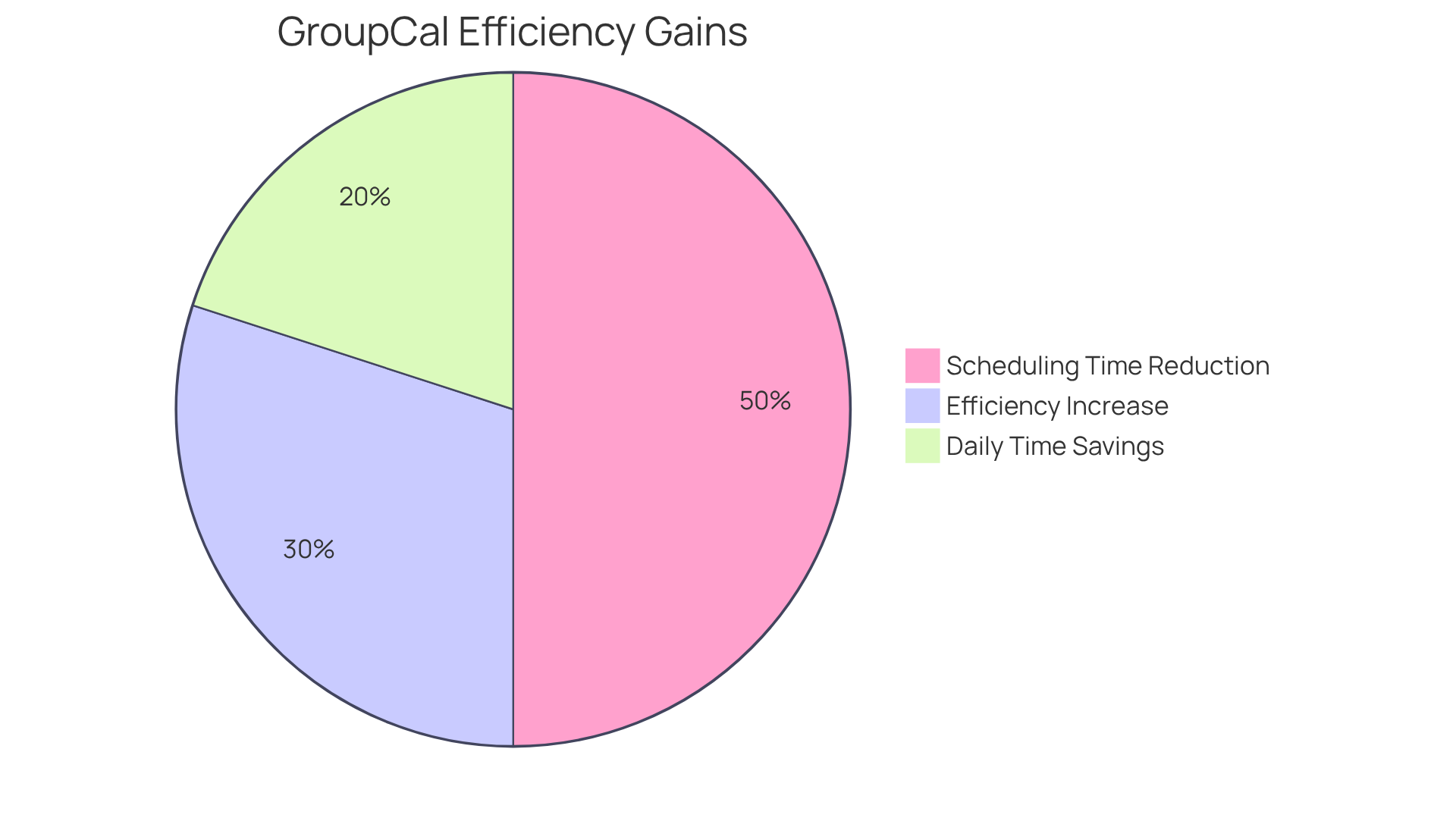
Google Calendar: Streamline Team Scheduling with Easy Sharing Options
Google Calendar addresses a critical challenge faced by organizations: communication inefficiencies. By enabling groups to establish a shared company calendar, it simplifies the arrangement of meetings and events. Users can customize permissions, determining who can view or modify the schedule, which safeguards sensitive information. Research shows that effective management of a shared company calendar can save groups an average of 4.8 hours weekly on planning tasks, highlighting the tool’s value in operational efficiency.
The integration of the shared company calendar with Google Workspace tools further enhances its effectiveness, facilitating seamless collaboration across platforms. Organizations utilizing this tool have reported a significant increase in attendance rates, rising from 73% to 94%. This statistic highlights Google Calendar’s capability to improve collaboration and engagement within teams. Additionally, the ‘Find a time’ function allows users to view participants’ availability side by side on the shared company calendar, greatly reducing scheduling conflicts and minimizing the back-and-forth often associated with meeting arrangements.
As organizations increasingly adopt AI-driven scheduling solutions, the integration of Google Calendar with other productivity tools is poised to streamline workflows and enhance collaboration. This evolution not only leads to greater operational efficiency but also empowers teams to focus on what truly matters. Explore the potential of Google Calendar and transform your scheduling practices today.
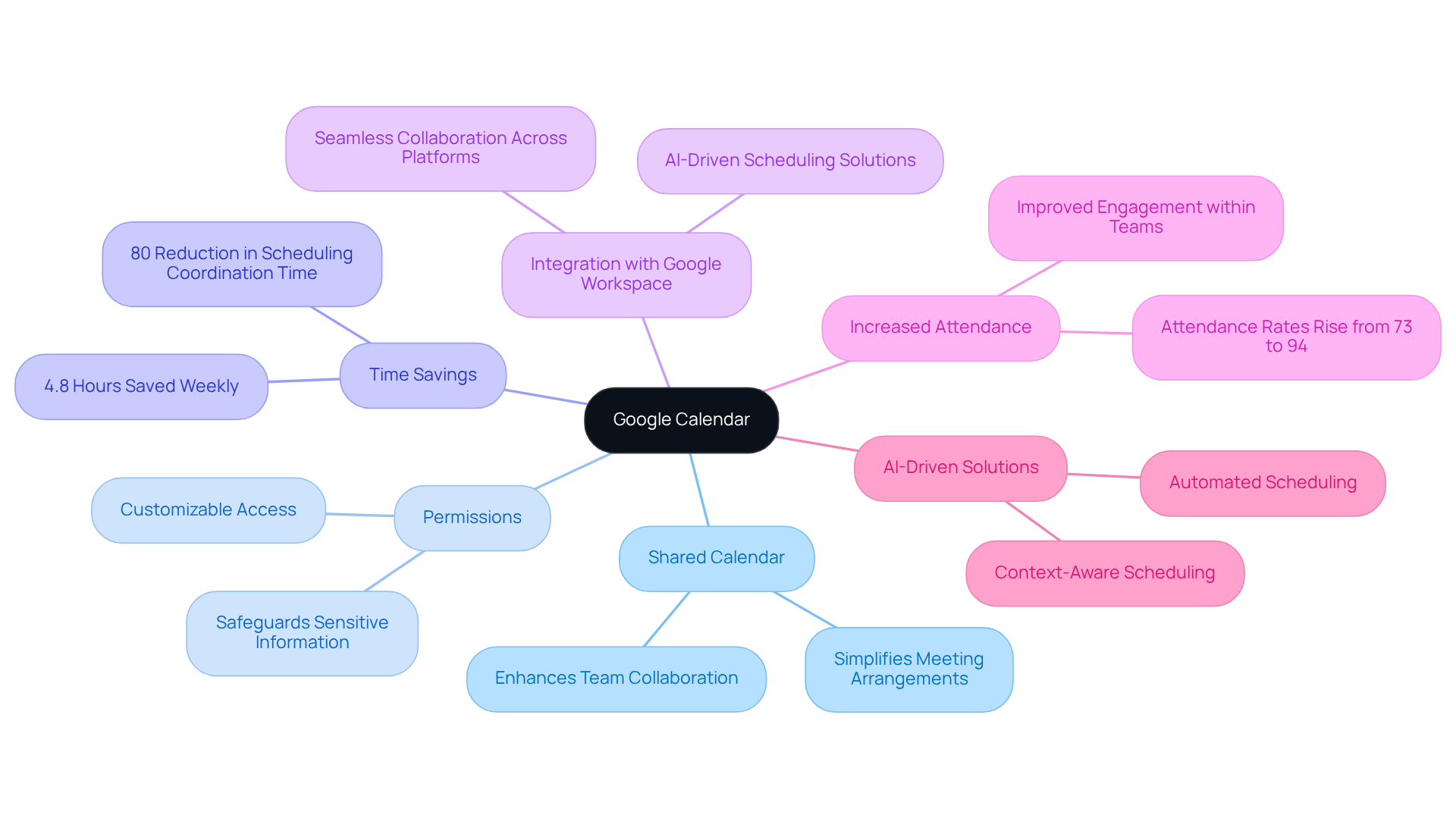
Teamup: Organize Schedules with Maximum Flexibility and Visualization
In today’s fast-paced environment, communication inefficiencies can severely hinder organizational productivity. Teamup addresses this challenge head-on with its highly customizable shared company calendar, which allows users to visualize their schedules in various formats – month, week, and day views. This adaptability empowers teams to quickly assess availability and effectively coordinate gatherings, ensuring that no opportunity is missed.
One standout feature of Teamup is its support for hierarchical sub-calendars, which is invaluable for organizations managing multiple departments or projects. This functionality facilitates clear oversight and coordination, enabling teams to stay aligned and focused on their goals. By leveraging these visual scheduling tools, organizations can significantly enhance their planning processes through the shared company calendar, leading to improved productivity and a marked reduction in scheduling conflicts.
Consider the impact: companies utilizing Teamup for project management have reported operational efficiency gains, with some experiencing productivity increases of up to 40%. The ability to visualize schedules not only simplifies planning but also fosters a culture of accountability and transparency among team members. This ultimately leads to improved project outcomes, reinforcing the importance of effective communication and organization in achieving success.
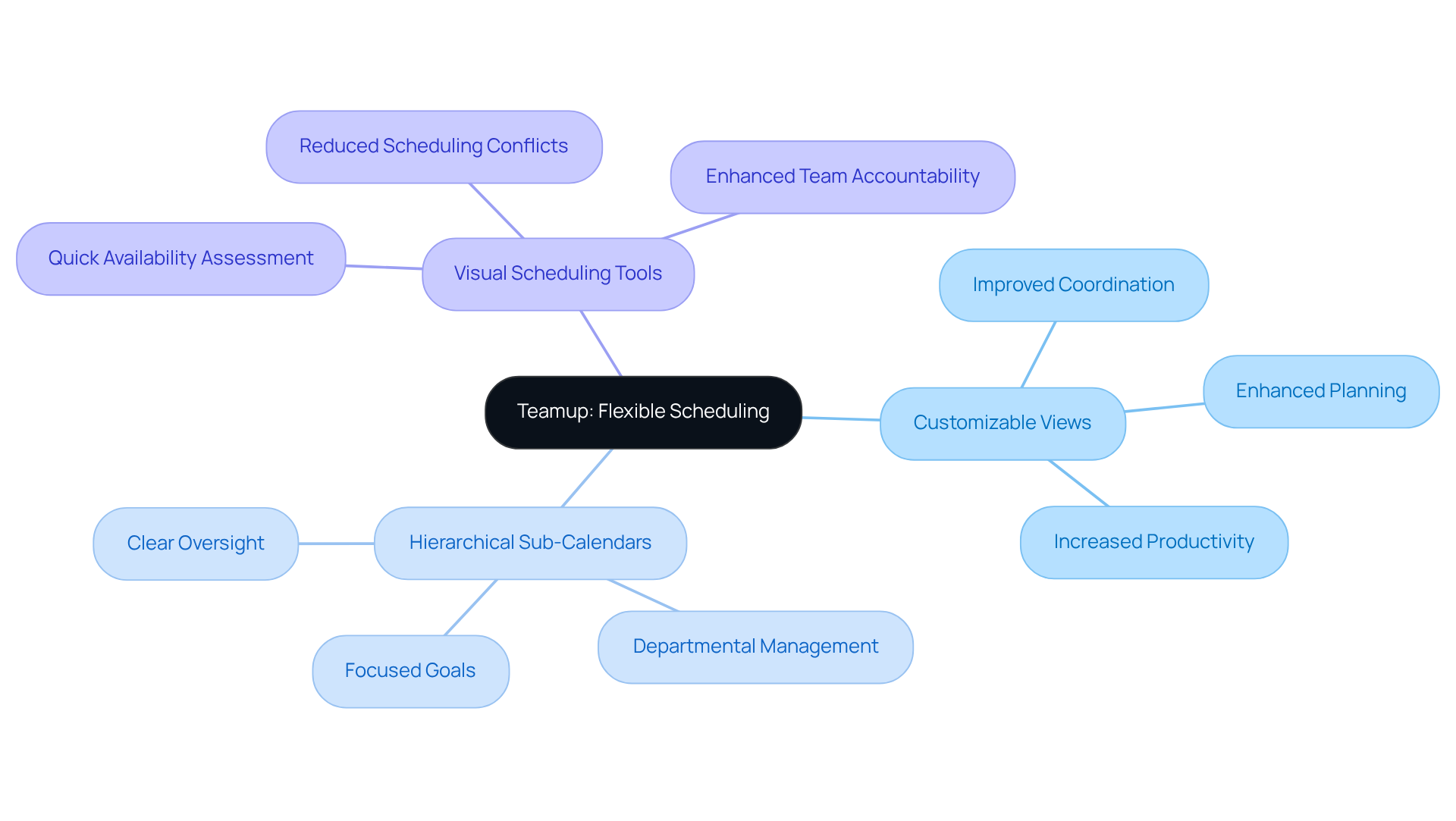
Microsoft Outlook Calendar: Leverage Familiar Tools for Effective Scheduling
In today’s fast-paced business environment, communication inefficiencies can severely hinder productivity. Microsoft Outlook Calendar addresses these challenges by seamlessly integrating with other Microsoft 365 applications, allowing users to schedule events directly from their email. This integration not only simplifies the process but also enhances operational efficiency, particularly for organizations already leveraging Microsoft products.
The Scheduling Assistant feature stands out as a game-changer, helping users identify available times for all participants. This minimizes the frustrating back-and-forth often associated with event planning. For instance, leading companies like Microsoft and Accenture have successfully utilized Outlook Calendar to improve their group gathering efficiency, resulting in better coordination and fewer scheduling conflicts. As Microsoft states, “The Scheduling Assistant greatly minimizes the time devoted to organizing gatherings, enabling teams to concentrate on their primary responsibilities.”
Moreover, the real-time updates and access to a shared company calendar provided by Microsoft 365 make Outlook Calendar an indispensable tool for businesses striving to enhance their time management efficiency. To fully leverage these advantages, consider incorporating the Scheduling Assistant into your planning processes. By doing so, you can streamline your operations and focus on what truly matters.
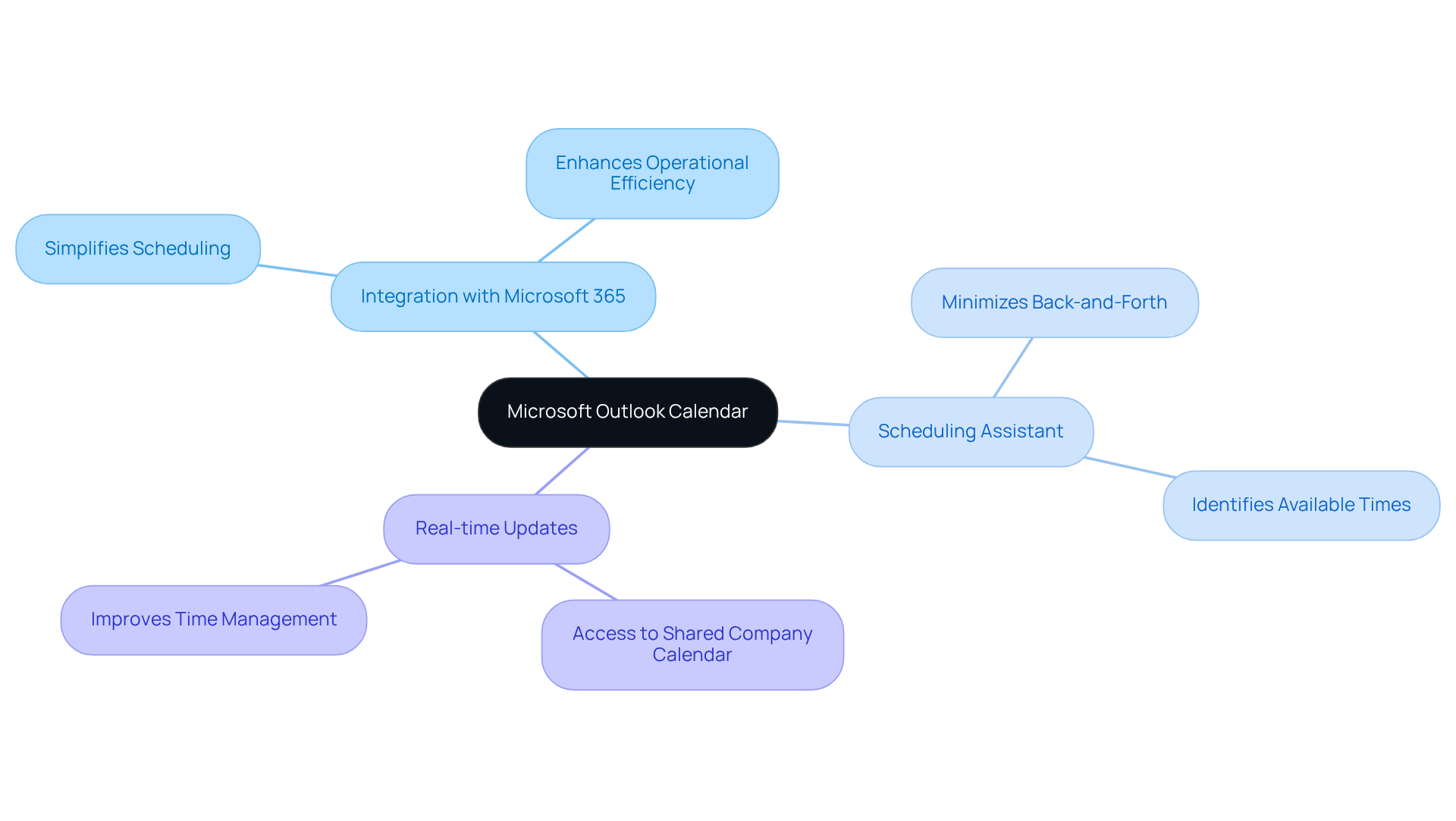
Calendly: Eliminate Scheduling Conflicts with Instant Meeting Setup
Calendly addresses a critical challenge in today’s fast-paced work environment: communication inefficiencies. The traditional back-and-forth emails often lead to scheduling conflicts and double bookings, wasting valuable time. In fact, employees spend an average of 11.3 hours per week in meetings, costing organizations approximately $29,129 annually per employee. This inefficiency is a productivity killer, particularly in hybrid workplaces.
With Calendly, users can generate personalized booking links that allow others to schedule meetings directly based on their availability. This innovative approach eliminates the tedious email exchanges, streamlining the appointment process. Features like buffer times and automatic reminders significantly enhance the experience for both users and their invitees, leading to improved efficiency in appointment setups.
Organizations that implement Calendly report a marked decrease in administrative burdens associated with conventional scheduling methods. This shift enables teams to concentrate more on collaboration rather than logistics, ultimately driving productivity and engagement. As highlighted by Calendly, “Inefficient planning is the new productivity killer, especially in hybrid workplaces.” This underscores the importance of effective planning tools like Calendly in managing time efficiently.
In summary, utilizing Calendly not only saves time but also reduces costs associated with meetings. By embracing this solution, organizations can transform their scheduling processes and foster a more productive work environment.
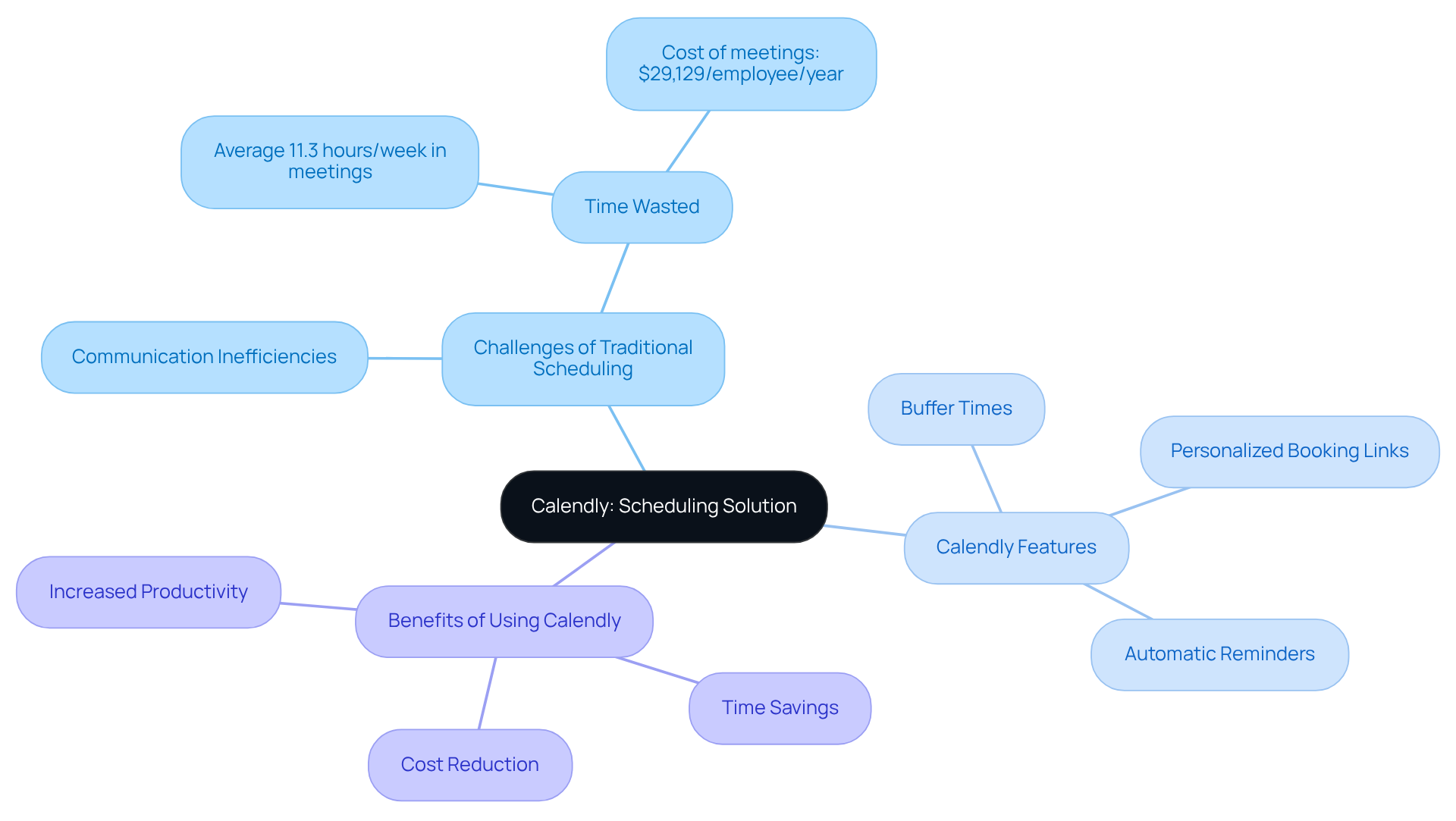
Zoho Calendar: Manage Team Schedules with Comprehensive Business Tools
In today’s fast-paced work environment, communication inefficiencies can severely hinder productivity. The shared company calendar in Zoho Calendar addresses these challenges head-on, providing a robust platform for managing group schedules. With features like event planning, reminders, and a shared company calendar, it enhances collaboration and reduces the need for multiple tools.
Organizations that leverage Zoho Calendar have reported impressive results:
- A 10-25% increase in employee productivity due to better-aligned schedules
- A staggering 40-60% reduction in time spent on schedule-related communications
A recent survey highlights this trend, revealing that ‘Organizations report an 86% rise in employee satisfaction after implementing employee management software.’ This statistic underscores the importance of integrated planning tools in enhancing workplace efficiency.
Moreover, case studies demonstrate that companies utilizing a shared company calendar, such as Zoho Calendar, for project management have seen significant improvements in operational efficiency. To maximize the benefits of this powerful tool, groups should establish clear planning protocols and fully utilize its features to enhance communication.
However, it’s crucial to address potential challenges, such as ensuring data security and managing employee concerns regarding AI scheduling integration. By proactively tackling these issues, organizations can fully harness the capabilities of Zoho Calendar, transforming their scheduling processes and driving productivity to new heights.
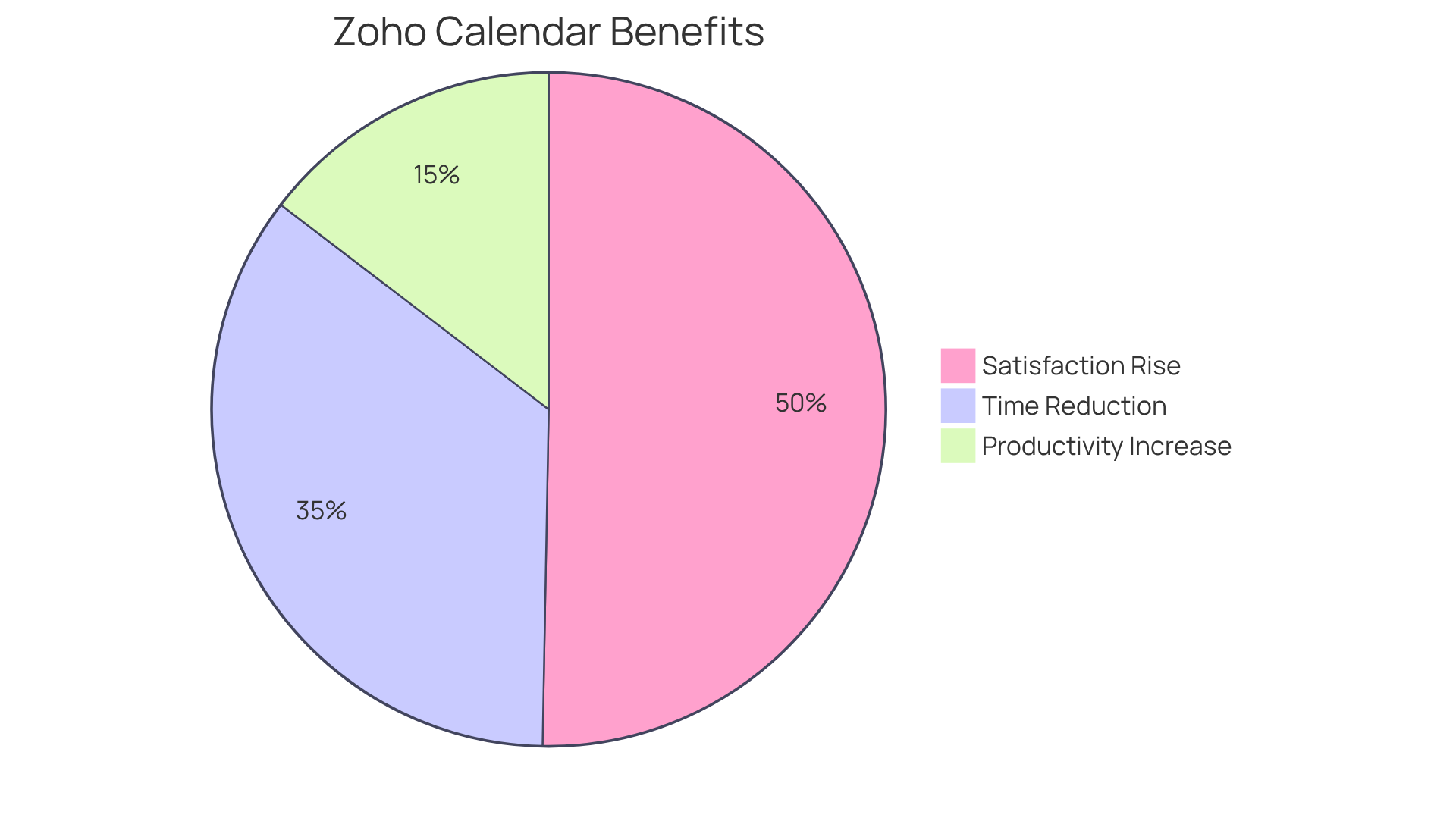
Apple Calendar: Integrate Scheduling Across Apple Devices for Team Efficiency
In today’s fast-paced environment, communication inefficiencies can severely hinder organizational productivity. Apple Calendar addresses these challenges head-on, empowering users to synchronize their schedules seamlessly across all Apple devices. This ensures that everyone stays updated with the latest information, fostering a cohesive and interactive atmosphere among teams.
The platform boasts strong features like a shared company calendar and event alerts, which significantly enhance organizational efficiency. By allowing the creation of multiple schedules for different projects or departments, teams can experience a remarkable boost in productivity. Research indicates that organizations utilizing a shared company calendar report an impressive 40% increase in overall efficiency. Additionally, those implementing comprehensive calendar synchronization see improvements in scheduling-related satisfaction scores ranging from 15% to 25%.
Real-time updates are a game changer, effectively reducing scheduling conflicts. With real-time synchronization, double-bookings and related issues can decrease by up to 80%. This enables teams to focus on essential tasks without the distraction of mismanaged appointments. As David Smith aptly notes, “Calendar analysis plays a key role in improving group efficiency and performance.”
Explore how Apple Calendar can transform your organizational communication and efficiency today.
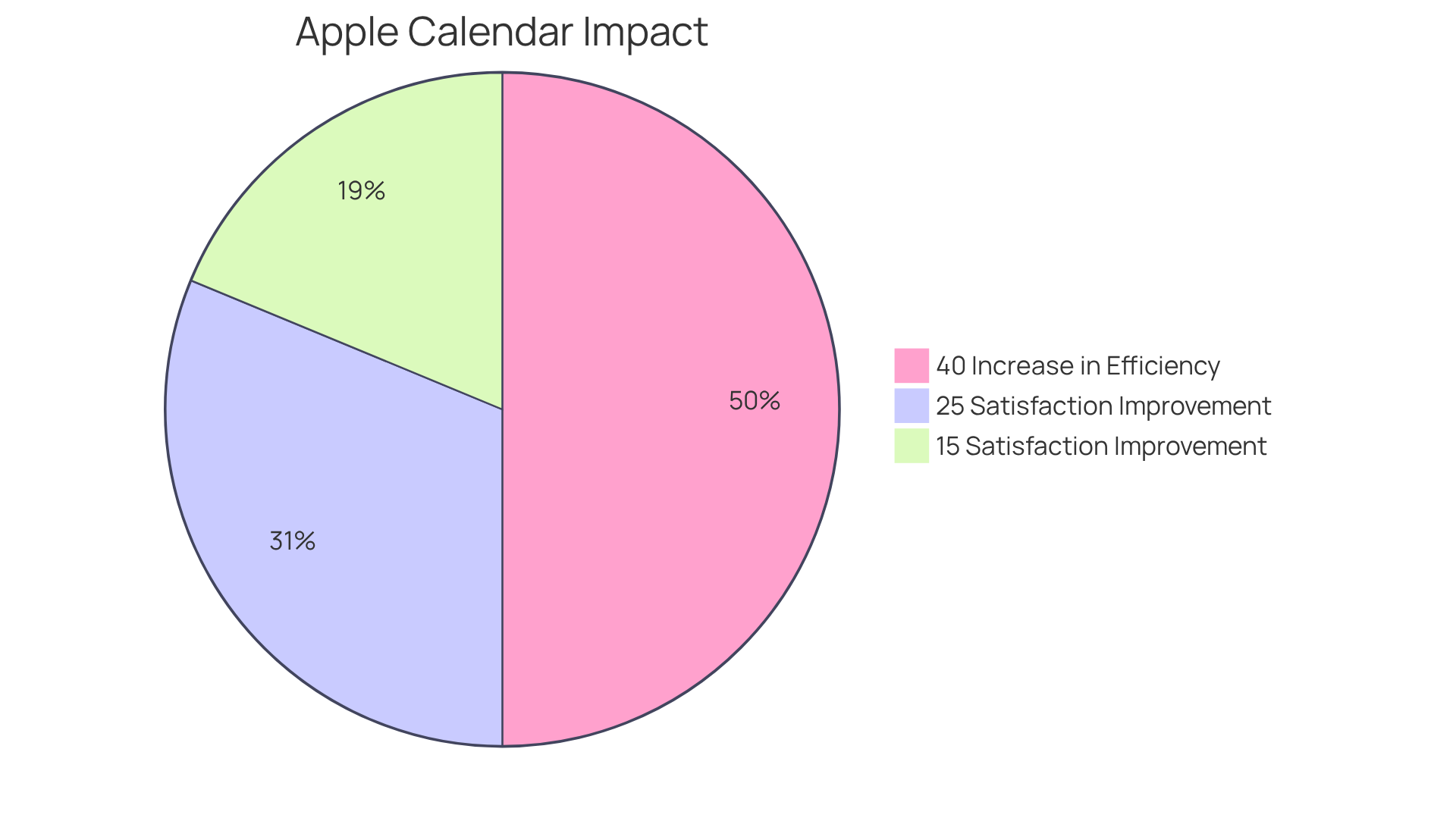
Trello: Visualize Project Timelines with Integrated Calendar Features
Trello’s calendar power-up addresses a critical challenge in project management: communication inefficiencies. This feature significantly enhances project management efficiency by enabling teams to visualize their tasks and deadlines in a structured shared company calendar format. Organizations that utilize Trello for scheduling have reported improved group productivity, as visual project timelines facilitate better planning and coordination.
This power-up provides a comprehensive overview of upcoming deadlines and responsibilities on the shared company calendar, allowing teams to stay organized and focused. Moreover, Trello integrates seamlessly with other tools, transforming it into a versatile platform that caters to diverse project management needs. As Benjamin Franklin wisely stated, “By failing to prepare, you are preparing to fail,” highlighting the necessity of structured planning for project success.
The ability to visualize timelines using the shared company calendar not only clarifies individual responsibilities but also fosters collaboration, ensuring that all team members are aligned toward common goals. In fact, poor project management can lead organizations to waste up to 12% of their resources, making effective tools like Trello essential for mitigating such issues.
To further enhance integration, users can easily copy the URL from ‘Your personal iCalendar feed‘ after enabling sync, allowing for straightforward integration with third-party systems to view Trello cards with due dates. Explore how Trello can revolutionize your project management approach and drive your team’s success.
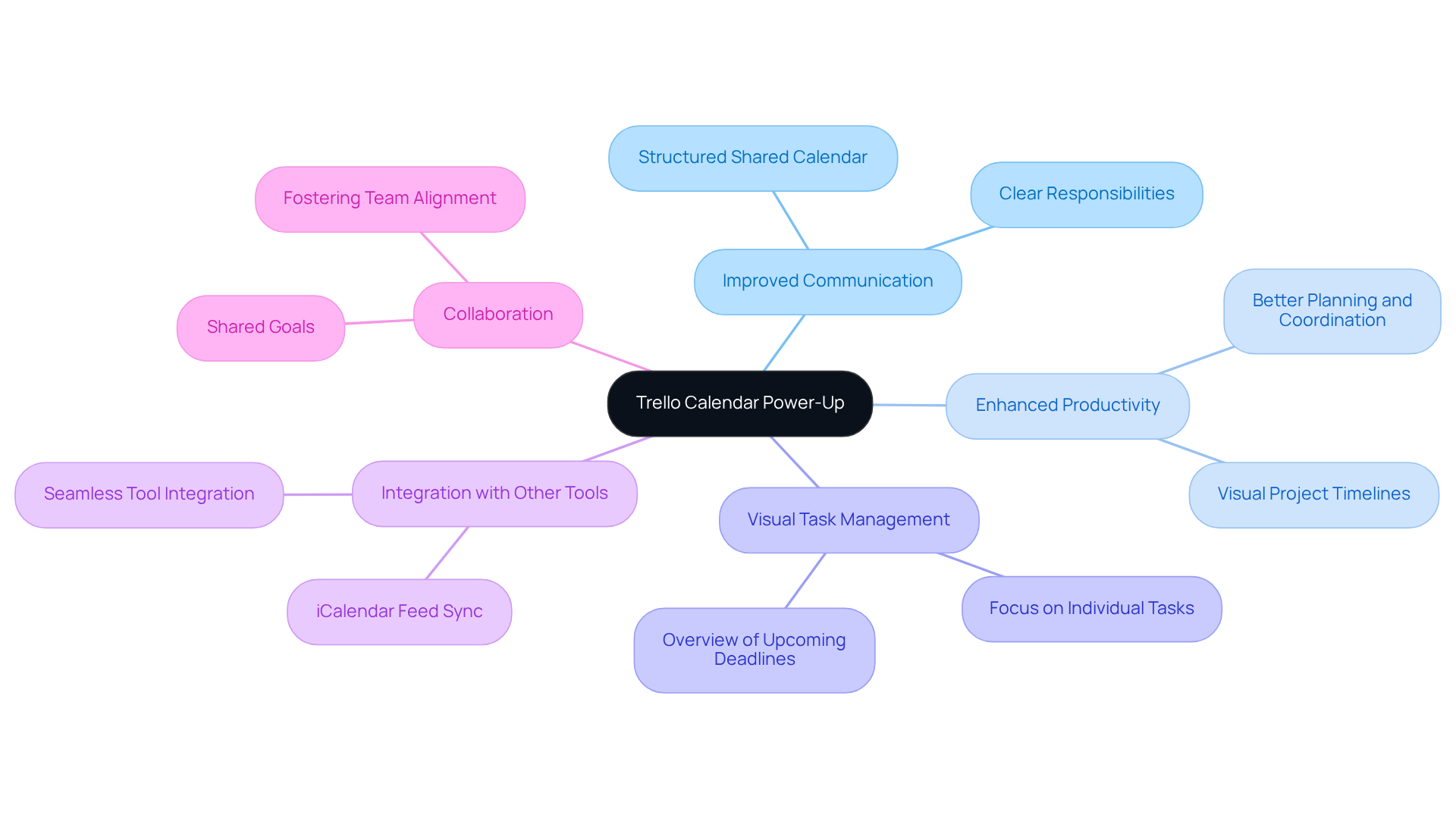
Slack: Keep Teams Aligned with Integrated Calendar Notifications
In today’s fast-paced work environment, communication inefficiencies can lead to missed opportunities and disorganization. Slack addresses these challenges by seamlessly connecting with various scheduling applications, ensuring users receive timely alerts about upcoming meetings and events directly within the platform. This integration not only helps teams stay aligned but also significantly reduces the chances of missed gatherings.
By automatically updating users’ statuses based on their calendar events, Slack enhances communication and coordination among team members. Imagine a workspace where everyone is on the same page, effortlessly informed about each other’s availability. This unique feature fosters a culture of transparency and collaboration, empowering teams to work more efficiently.
Explore how Slack’s integration can transform your team’s communication dynamics. With its ability to streamline scheduling and enhance operational efficiency, it’s time to elevate your team’s performance. Don’t let communication barriers hold you back – embrace the solution that keeps your team connected and informed.
Conclusion
Effective management of shared company calendars is essential for boosting productivity and collaboration within teams. The tools highlighted in this article – AutoSuite, GroupCal, Google Calendar, and others – offer innovative solutions that streamline scheduling, minimize communication inefficiencies, and cultivate a more organized work environment. By leveraging these tools, organizations can significantly enhance their operational efficiency, allowing teams to concentrate on what truly matters.
Each tool presents unique features tailored to tackle specific challenges in calendar management. For instance, AutoSuite’s centralized scheduling capabilities and Calendly’s instant meeting setup not only save time but also improve overall team coordination. The statistics shared throughout this article illustrate the tangible benefits of adopting these tools, including increased productivity, fewer scheduling conflicts, and heightened employee satisfaction.
In an era where effective communication is crucial, embracing advanced calendar management tools can revolutionize team operations. Organizations should consider integrating these solutions into their workflows to optimize scheduling processes and foster a more collaborative atmosphere. By doing so, teams can navigate the complexities of modern work environments with greater ease and efficiency, ultimately driving success and achieving their goals.
Frequently Asked Questions
What is AutoSuite and how does it enhance team coordination?
AutoSuite is a centralized calendar solution that integrates into existing workflows, simplifying the planning process for teams by enabling immediate meeting arrangements through Schedulelink. This reduces communication inefficiencies and enhances overall productivity.
What benefits do organizations experience when using centralized scheduling tools like AutoSuite?
Organizations that adopt centralized scheduling tools report a 71% increase in success rates, improved coordination, and minimized scheduling conflicts. AutoSuite enhances visibility into group availability and empowers teams to manage their appointments efficiently.
How does GroupCal improve schedule management?
GroupCal offers powerful sharing capabilities that streamline the management of personal and shared company calendars. It provides real-time updates and customizable permission settings, which reduce confusion and enhance communication among teams.
What impact does GroupCal have on organizations with hybrid work models?
GroupCal is particularly beneficial for organizations with hybrid work models as it ensures all team members are promptly informed of changes, fostering a culture of transparency and improving collaboration.
What are the reported efficiency gains from using GroupCal?
Organizations using a shared company calendar like GroupCal report a 50% reduction in time spent on scheduling-related tasks and a 30% increase in collective efficiency, saving an average of 50 minutes daily.
How does Google Calendar facilitate team scheduling?
Google Calendar allows groups to establish a shared company calendar, simplifying the arrangement of meetings and events. Users can customize permissions to safeguard sensitive information, leading to better operational efficiency.
What are the benefits of integrating Google Calendar with Google Workspace tools?
The integration enhances collaboration across platforms, significantly increases attendance rates from 73% to 94%, and allows users to view participants’ availability side by side, reducing scheduling conflicts.
How does Google Calendar contribute to operational efficiency?
Effective management of a shared company calendar using Google Calendar can save groups an average of 4.8 hours weekly on planning tasks, streamlining workflows and enabling teams to focus on important work.
What is the significance of AI-driven scheduling solutions in relation to Google Calendar?
The integration of Google Calendar with AI-driven scheduling solutions is expected to streamline workflows, enhance collaboration, and improve overall operational efficiency for organizations.
